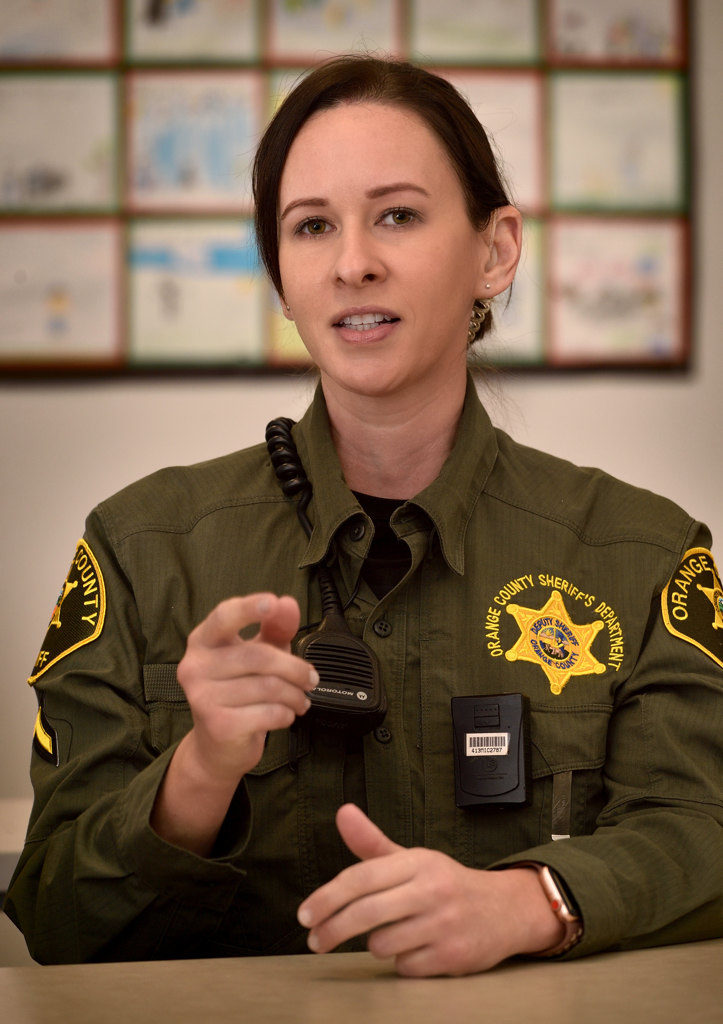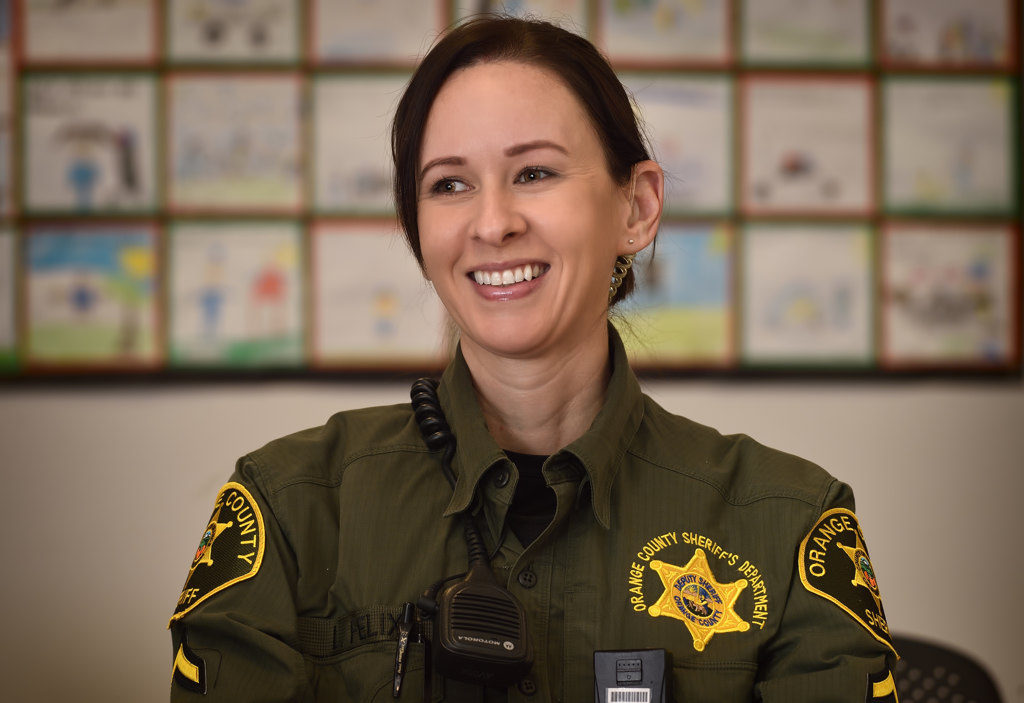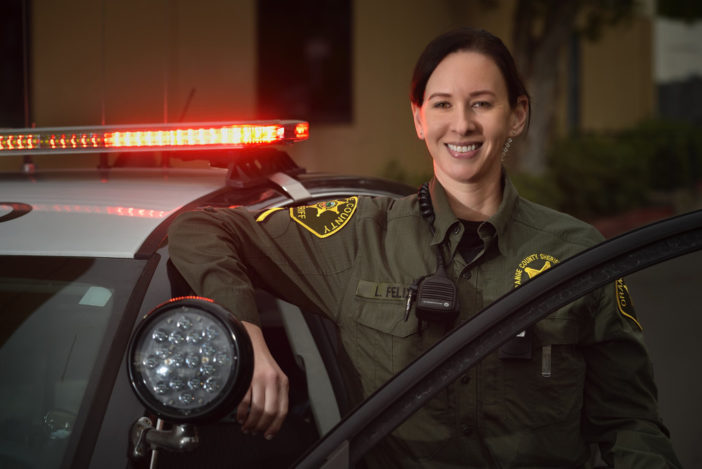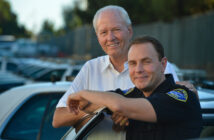As the horrors of the mass shooting in Las Vegas played out on the evening of Oct. 1, 2017, Lauren Felix got on the phone with her brother, who was attending the Route 91 Harvest music festival with his girlfriend.
Felix, a deputy with the Orange County Sheriff’s Department, spent two hours on the phone with her brother, Eddie, keeping one ear on the Vegas Metro PD scanner as she told him what was going on and what to do while he and his girlfriend, Ashley (now his wife), were hiding.
“I have never been more grateful for the training the department has given me than in that moment,” says Felix, referring to active shooter classes offered at the OCSD.
Felix, a patrol deputy in Aliso Viejo, now finds herself, along with eight other deputies, among the elite when it comes to training other deputies new to patrol.
In early 2019, the OCSD launched a Master Field Training Officer (MFTO) program, opening up 30 positions for the best of the best of the agency’s 125 or so FTOs. To date, nine of those positions have been filled (although two Master FTOs already have been promoted to investigators).
The program, the brainchild of Assistant Sheriff Jeff Hallock, was designed to allow the OCSD to retain deputies like Felix who are in critical patrol assignments while providing the necessary leadership and training to newer deputies.
The program was launched at a time when the OCSD finds itself with a relatively green collection of patrol deputies due to retirements and attrition, officials say.
Deputies who become FTOs are considered the agency’s future leaders. Master FTOs undergo even more training; they must log at least 1,200 training hours to effectively teach the ropes to new patrol deputies.
“The (Master FTO) program was created to allow experienced patrol training officers to take on additional responsibility and assert themselves as leaders amongst their peers,” Hallock said.
For Felix, who started at the OCSD as a crime analyst 13 years ago and who became a deputy in March 2012, first working the jails before moving to patrol in Laguna Hills in 2015, becoming a Master FTO is an honor and a privilege.
“These (patrol trainees) are going to be my partners,” says Felix, 37, during an interview last month at the OCSD’s Southwest Division offices in Aliso Viejo. “So I like having a hand in how they’re trained and showing them how we do the job and being safe and being a good partner and working right alongside them once they’re off training.
“I get a lot of satisfaction out of seeing them be on their own and be successful deputies.”
The OCSD’s Master FTOs have a single stripe on their uniform.
“This is first day I’ve actually worn it,” says Felix. “I’ve gotten a lot of comments.”
The OCSD’s other Master FTOs are Jason Arellano (Stanton), Jose Arvizo (Lake Forest), Mark Dent (Laguna Niguel), Daniel Foster (North Patrol), Steven Hoffman (Dana Point), and Timothy Novinger (Stanton).
Sgt. Dan Corwin, of the OCSD’s Field Training Bureau, said the agency is working on filling the other Master FTO positions.
“Patrol is one of the hardest jobs in the department – it has the most liability, and the most exposure to danger,” Corwin says.
Master FTOs have to test for the position.

OCSD Master FTO Dep. Lauren Felix talks about her role in training other deputies.
Steven Georges/Behind the Badge
“They have to have good evaluations,” Corwin explains. “We look over all their reports, and we look at their performance as an FTO in their documentation and training other people.
“What makes an effective FTO is to have a really good understanding of adult learning concepts and to eliminate human factors. You have to be unbiased and fair, you have to be personable, and you’ve got to be able to recognize how someone learns most effectively.
“Lauren has done an awesome job,” Corwin adds. “It’s great to have her in that position. She has a lot of experience. She’s very personable. She’s very knowledgeable, very humble, and not too proud. She’s just done a phenomenal job.”
GLOBALLY MINDED
Felix, who grew up in Orange and went to Villa Park High School, initially didn’t have law enforcement on her radar as a career, although she was exposed to it somewhat growing up.
Her uncle, Mike Felix, was a lieutenant with the LAPD, and she recalls her father, who owns an engraving business, listening to Orange PD calls on a scanner.
Felix majored in international studies at Cal State University, Long Beach, and initially planned to seek a career at a U.S. Embassy overseas. She spent a semester studying abroad at the University of Sydney.
“I remember being in high school and just thinking it would be really, really, really interesting,” she said of that career.
Felix worked as a bank teller while in college and after she graduated. Some time after graduating, a brochure from Cal State University, Fullerton, caught her eye. It advertised a certificate program to become a crime analyst, a non-sworn law enforcement position in which specialists study crime data and patterns.
Felix enrolled in the one-year certificate program.
“After my first class,” she recalls, “I knew it was what I wanted to do.”
As part of the certificate program, Felix served an internship on OCSD’s Crime Analysis Unit.
“I went through cold case homicide files and helped enter the data in the FBI’s Violent Criminal Apprehension Program (ViCAP),” she says.
In 2007, the OCSD hired Felix as an office specialist on its Crime Analysis Unit. A few months after that, she was hired as a full-time crime analyst and spent the next 3 ½ years in that position.
After going on several ridealongs, Felix acquired an interest in becoming a deputy.
At the time, now-retired OCSD Sgt. Yvonne Shull was Felix’s boss.
“She had a very direct impact on me and my decision to become a deputy,” Felix says. “I walked into her office and said, ‘I think I want to do this,’ and she said, ‘I think you should do it.’”
Shull, who retired in 2014 after more than 28 years at the OCSD, leaving the agency as a legendary homicide sergeant, says she always saw potential in Felix becoming a deputy.
“She was a very good crime analyst and she came to me one day and she goes, ‘What would you think about me being a deputy?’” Shull recalls. “And I say, ‘Go for it.’ I go, ‘You have the aptitude to do it. You can do it. You just have to put your mind to it. Many people will say, ‘Oh, you’re too small, or this or that.’ I go, ‘I’m telling you, you can do it.’”
Shull, who has kept in touch with Felix and sees her now and then, says the Master FTO program is a great idea.
“We’re a large agency,” Shull says, “so having a ‘one-striper’ that people can go to to get their questions answered is a good idea, because some people don’t want to go to a sergeant. They would rather go to a FTO.”
Before entering the academy to become a deputy, Felix worked as a correctional services assistant (CSA) to gain some experience going through an academy and in the jails.
After serving as a CSA for nine months, Felix entered the OCSD Regional Training Academy in September 2011.

OCSD Master FTO Dep. Lauren Felix began her career at the agency at a crime analyst, a now-sworn position.
Steven Georges/Behind the Badge
“The physical aspect was a battle every day,” says Felix, who graduated from the academy in March 2012 and was assigned to the women’s jail.
Felix, who became an FTO in August 2017 while she was a patrol deputy in Laguna Hills, plans to add to her 4 ½ years as a patrol deputy before considering vying for promotion.
“I enjoy teaching,” she says of being an FTO. “It’s an important job to train the people that come behind you.”
In her free time, Felix enjoys hiking, reading, and going to country music concerts. She also loves spending time with her nephew and niece, Colin and Clare.
One thing she doesn’t do anymore is watch old episodes of “COPS.” She has her excellent training chops to thank for that.
“I grew up watching that show,” Felix says, “but I can’t even watch it anymore. The tactics, the training I see is like, ‘No that’s bad. Don’t do that!’”
 Behind the Badge
Behind the Badge



